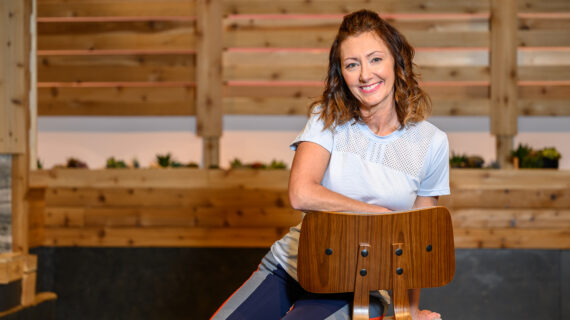Announcer:
The following program is a PBS Wisconsin original production.
Frederica Freyberg:
President Joe Biden delivers his State of the Union address before landing in Wisconsin. State lawmakers outline strategies for the laborious budget process and a private land dispute leave residents trapped in their homes.
I’m Frederica Freyberg. Tonight on “Here & Now,” a preview of upcoming state budget deliberations. The emergency efforts being deployed in a small town with off the charts PFAS contamination. A conflict of land ownership leads to a standoff with no end in sight. And the next in our series of interviews with candidates for the state Supreme Court. It’s “Here & Now” for February 10.
Announcer:
Funding for “Here & Now” is provided by the Focus Fund for Journalism and Friends of PBS Wisconsin.
Joe Biden:
Laborers here in Wisconsin, union workers across the country are seeing it first-hand because for the first time in a long time, we’re building an economy from the bottom up and the middle out. The bottom up and the middle out with products made in America with union labor, not labor, union labor.
Frederica Freyberg:
That was President Joe Biden in DeForest this week straight off his State of the Union address where he promoted his economic plan, increased jobs and lower inflation. In state news, next week Governor Tony Evers will give his budget address where he will lay out his vision for how the state should spend the $7 billion surplus. We asked the Legislative leaders and the governor if he should craft a budget that would be welcomed by Republicans or if he should continue to include big ideas even if they were dead on arrival in the Republican Legislature.
Greta Neubauer:
Our role, I do see, as twofold, right? We need to put forward that vision for what we believe Wisconsin should look like. We need to make sure that we’re continuing to say that working families deserve better and here’s the path that we would take to get them there. And we need to find every opportunity to work across the aisle. That’s what the budget process does, right?
Devin LeMahieu:
I think a better question is is the governor willing to actually negotiate with us during this budget cycle? If he wants to put out a budget with his political priorities, that’s fine but we’ll do what we’ve done in the past. Start from base and go forward. But if the governor is willing to work with us and negotiate, I think we can accomplish some of the things he wants to accomplish while still doing important tax relief, investing in education, expanding school choice.
Melissa Agard:
So my Republican colleagues might say, oh, we’re not going to legalize cannabis in Wisconsin. That’s dead on arrival. We’re not going to expand health care in the state of Wisconsin. That’s dead on arrival. We’re not going to support our public schools to the full capacity that we should. That’s dead on arrival. At the same time, we know that those are issues that the vast majority of the people in Wisconsin, upwards of 70-80% on some of these issues, support. They are not partisan. And this is our opportunity to debate them because frankly when they’re introduced as standalone bills in the Legislature, the Republicans who have control over that committee process aren’t even allowing us to come to the table and have a debate, having a committee meeting.
Robin Vos:
What Governor Evers is doing is if he chooses to put together a document that’s chock full of a wish list, he really can’t be critical when none of it’s included. There might be good ideas in there, right? And if he chooses to make it so full of things that are unappetizing to Republicans, you’re not even going to have a chance to have some of the better things taken a serious look at. It seems to me that most people around the country that I have seen in divided legislatures when you have a governor of one party and the Legislature of the another. They don’t start off with some kind of a crazy idea. Governor Doyle did that. If you look at how he chose to put his budgets together, he didn’t chock it full of all kinds of liberal crazy stuff. He put together what he thought was as reasonable as he could be and he hoped the Republicans would do the same thing. He probably got a lot more of the things he wanted than Tony Evers did with his method so it’s up to him to decide.
Tony Evers:
If we started with a compromise position first of all, people of Wisconsin would be utterly disappointed we didn’t talk about some issues they think are important and maybe the Legislature and the Republicans in the Legislature don’t. It’s important to talk about the values that we hear about and have people talk about it. And come to some compromise position if they can.
Frederica Freyberg:
With the unprecedented projected budget surplus, the jockeying is underway for how much of it to spend funding critical needs. Among them, cleaning up forever chemicals or PFAS contamination across Wisconsin. Including in the tiny town of Stella near Rhinelander where residents are now supplied bottled water because testing of private wells found sky high levels of the dangerous PFAS. The worse contamination in Wisconsin. The Republican state senator whose district includes Stella says some of the surplus could be used for remediation. Mary Felzkowski is also a member of the powerful budget writing Joint Finance Committee. We talked with her at her Capitol office. First, I do want to say thanks very much for doing this with us.
Mary Felzkowski:
You’re very welcome.
Frederica Freyberg:
So you have said that PFAS contamination and mitigation is not a partisan issue. It certainly seems to have been in the recent past but what has changed now?
Mary Felzkowski:
I would disagree it’s been a partisan issue. I think there’s been maybe some differences of opinions between the different parties on where the levels should be set. Whether it’s 20 parts per trillion, 70 parts per trillion. Canada was at one time at 120 parts per trillion. And I think the Republicans’ stance on this is let’s not get ahead of technology. You can set a PFAS level very, very low but if we don’t have the technology to get there, why would we do that?
Frederica Freyberg:
Do you feel as though we have more time when we’re dealing with these forever chemicals?
Mary Felzkowski:
We don’t have any time when we’re talking about people’s health but we have to be realistic. Technology is moving at an accelerated rate and we need to make sure the levels that we’re setting are attainable levels.
Frederica Freyberg:
Do you have any idea what level you would think it should be?
Mary Felzkowski:
So I’ve heard – when you talk to EPA, at first it was – they were at 70 parts per trillion and I know Wisconsin DNR was pushing for levels at 20 parts per trillion. It is my understanding that EPA is now moving towards that 20 parts per trillion also.
Frederica Freyberg:
Meanwhile in the town of Stella, residents with their private wells are seeing the highest levels of these forever chemicals anywhere across the state and what is it, 50 households are now being given drinking water. What is your message to these people in your district?
Mary Felzkowski:
I went to the hearing in Stella when they had a public hearing on it and the DNR was there. Department of Health was there and some of the wells are coming in at 46,000 parts per trillion. The saddest part about this is we don’t know where it’s coming from yet but PFAS has a fingerprint so when they can start testing these chemicals, it will have a distinct fingerprint, so to speak and I know this is not a real good scientific explanation but they will be able to trace it back to its source. I think right now, I think what we’re doing as far as making sure they have clean drinking water, I can’t imagine being one of the people in the town of Stella because this is not only your life but now we have a decrease in property values. Everything there is — and with no answers.
Frederica Freyberg:
Can you tell the people in Stella and elsewhere across the state that the calvary is now coming because budget writers will be able to work with a more than $7 billion surplus to address PFAS contamination?
Mary Felzkowski:
So the $7 billion surplus, we’re going to pause on that. $4.5 billion of that is one-time money. It’s not forever money. It’s not like we’re going to see that surplus year over year over year. Fiscal Bureau estimates the surplus that will be a continuing surplus is about $2.9 billion. So the large portion of the surplus is one-time money but in my world, one-time money — this would be a great start for one-time money. I support the governor putting $100 million in there but I would also like to look at the programs. When he talks about his Well Compensation Fund and that might not be structured perfectly for the people that are dealing with PFAS. We need a lot more knowledge on where did it come from and then how do we clean it up.
Frederica Freyberg:
Do you believe the Republican majority and budget writers will also say that they like the $100 million the governor is talking about?
Mary Felzkowski:
We haven’t had those conversations yet so I can’t really say but I know my colleagues are very concerned with this and that we will address it. I can’t speak for everyone else about the level of commitment on that.
Frederica Freyberg:
Why shouldn’t businesses that caused this contamination have to pay for the remediation?
Mary Felzkowski:
I do believe that any type of remediation will be a public-private partnership but we have a chemical that was developed, studied by the FDA and the EPA and given a stamp of approval by the government that said this is a good chemical, go ahead and use it. We use it in medical devices. We use it in food. We use it in water-proofing our clothing. We use it in firefighting foam. The Rhinelander airport is being sued right now because they’re saying they are one of the contributors to the PFAS contamination. Yes, they are but they were mandated by the FAA to utilize it and have it on hand. So are we really going to bankrupt a company that was using a government-approved chemical and told that it’s safe to use? If we do that, I think they can be part of the solution but I don’t think they’re the sole solution. Tough questions.
Frederica Freyberg:
With that tough question, we need to leave it, senator, thanks very much.
Mary Felzkowski:
You bet. Thank you for having me.
Frederica Freyberg:
That was Senator Mary Felzkowski. Her district also includes Lac du Flambeau where a property standoff between tribal government and local residents has come to a head. “Here & Now’s” Nathan Denzin reports how access to homes over tribal land has been blocked over an easement dispute.
Nathan Denzin:
It’s been two weeks since the Lac du Flambeau Tribe blocked four access roads that run through tribal lands and residents say they’re not sure if the chains will come down any time soon.
Dave Miess:
Unless all the parties are really willing to sit down in person, I’m concerned this could drag on for a while.
Nathan Denzin:
The dispute that blocked the roads has taken course over the last 10 years. Starting in 2013, agreements for passage on the roads lapsed between the tribe and title companies that ensure most of the houses in the area. Since then, no new agreement has been in place. The roads in question cut through tribal lands, which, according to the tribe, means the non-tribal homeowners have been trespassing. Miess owns a home in the area and says he and his neighbors were given about two weeks’ notice before the barriers went up. In a statement released January 31st, Lac du Flambeau Tribal President John Johnson Senior said, “The Town of Lac du Flambeau and the title companies have not always acted in good faith to resolve this issue. The tribe is fed up with the title companies’ games.” In response to the barriers, First American, one of the title companies involved, told PBS Wisconsin, “First American Title has made a good faith offer on behalf of our insured homeowners to the tribe based on historical precedent from prior negotiated right-of-way easements.” Although First American says they have made an offer, the barriers have remained in place. Because of these roads being blocked, about 55 households are now stuck in a situation where their cars can leave but would not be allowed back in.
Dave Miess:
The thing we’ve tried to say is that the people that don’t have responsibility are the people that ultimately are paying the price for this are the homeowners.
Nathan Denzin:
In order to get groceries and other supplies, Miess and his family walk across a lake to their car, which is parked at a neighbor’s house located on a public road.
Dave Miess:
If we need to go get groceries, for example, our kids are all grown but we have their sleds, their little plastic sleds and we walk across the lake and go to our neighbors and get in the Jeep and only get as much stuff as we can fit on the sleds because it’s got to make it back.
Nathan Denzin:
Miess says the trek across the lake isn’t too bad for his family but for others in his community, the trip isn’t possible.
Dave Miess:
We do have a person and she actually had a high schooler that is actually a special needs child and she and her child actually had to leave and move back to Iowa to some family members because they literally couldn’t — there was no way to handle this otherwise.
Nathan Denzin:
While the roads are blocked, Vilas County Sheriff Joe Fath said he has been in contact with the Lac du Flambeau Tribal Police who say they have directed twice daily wellness checks. Police say they have delivered medication to at least two residents and have offered food box deliveries. However, Miess says those wellness checks are far less frequent than the tribe claims.
Dave Miess:
They’ve been back in our neighborhood twice in that time. I know some people have maybe only had a check-in one time.
Nathan Denzin:
While residents wait for a solution that would grant them access to the roads again, Governor Evers met with tribal leaders Monday and said the meeting was productive. In a statement the governor said, “As this is an ongoing private dispute, my priority as governor is encouraging everyone in the area to engage amicably and peacefully with each other while working to bring all parties to the table to resolve this issue quickly.” The Lac du Flambeau Tribe has since put out a statement saying they are hopeful the issue can be resolved in a timely manner while the town met Tuesday to consider possible legal action. One possible short-term solution requested by both the town and First American would be to negotiate new easements in person and lift the barriers while negotiating. However, no action has been taken. Miess says nobody is sure when the barricades will actually be lifted.
Dave Miess:
We need these people to all take responsibility for this to get this thing figured out, get these roads unblocked, get the easements in place, make sure the tribe is compensated fairly for their easements and we can all get back to lives.
Nathan Denzin:
For “Here & Now,” I’m Nathan Denzin.
Frederica Freyberg:
Many thanks to WJFW-TV in Rhinelander for their videography for that report.
Finally tonight, we have the fourth in our series of interviews with the candidates for a seat on the Wisconsin Supreme Court. The primary is on February 21st with the top two vote getters advancing to the general election in April. Earlier this week “Here & Now” senior political reporter Zac Schultz sat down with Jennifer Dorow, a Waukesha County circuit court judge.
Zac Schultz:
Can you break down your judicial philosophy for me?
Jennifer Dorow:
Sure, I’m a judicial conservative which means I believe in upholding the law as written and applying that law to the facts of every case, giving deference to our legislative statutes because that’s where policy is made and never, ever legislating from the bench.
Zac Schultz:
How do you define legislating from the bench because there’s a lot of disagreement over when a court makes a ruling whether they’re rearranging the law to fit a need or an opinion versus this is all we have to go on?
Jennifer Dorow:
When a judge or justice inserts their own political agenda, policy views or personal opinions on what the law should be, that’s my definition of legislating from the bench. And I say that because it’s the role of a judge to apply the law as written to the facts of the cases that come before us, to never prejudge those cases, to be fair and impartial and in our government. We have a system that’s set up, a very clear separation of powers. Our legislative figures, our Assemblymen, our senators, they make the law. That’s where the policy of the state is set. And then judges interpret that when called upon to do that. It’s very important that judges act more like umpires, right? We don’t make the law, we just decide the law and if you think of the analogy to baseball, right? Just calling the balls and strikes, not the pitcher, not the catcher, but just calling the balls and strikes and that’s what a judge does and a justice should do is call the legal balls and strikes that come before him or her.
Zac Schultz:
So you said the politics shouldn’t enter into the decision but obviously this is a political race and there are a lot of political factors weighing in to all the candidates and when constituents are out there thinking about who they want to vote for, some of them are thinking through a political frame of reference. How do you balance that when you want people to know that you will be impartial on the bench but people also want to have a sense of your politics?
Jennifer Dorow:
It’s very important to honor that this is a non-partisan race and that my political views or my policy preferences are not going to impact what I do on the bench. It’s very different from the liberal candidates and I know we give them labels, right, liberal and conservative and I think that’s just a simple way to identify for the public what our judicial philosophies are and what our approach to the law is but you have two candidates who are openly giving us their political agenda, campaigning on a political agenda and forecasting how they would vote on many important issues. They’re telling the future litigants, their mind is made up. They don’t care about the facts. They don’t care about the law. Vote for me because I’ll do x, y or z. That is not the methodology I will follow and that I have been following for 11 years on the bench. It’s really important every judge and justice stay in their constitutional lane and that’s what I’ll do.
Zac Schultz:
What should voters then think of your background? Who you were appointed by? Who’s endorsing you? Who’s supporting you? Where the outside money that’s going to support you comes from? Where your family members and their connections to other political figures because obviously those exist and the liberal candidates in this race are saying, well, we’re just being upfront and honest with voters and it’s the conservatives who are trying to hide where the real influence may be.
Jennifer Dorow:
The candidates on the left are telling you about a political agenda when this is not a race for a legislative or gubernatorial position. That’s why it’s important for me as someone who believes in upholding the rule of law and being fair and impartial to not talk about my personal preferences. You know, I wear a robe for a reason. One of those reasons is to show the public, show the litigants and then remind me that I need to be fair and impartial. I cover up those personal preferences so that I make a decision based on the law. When you make a decision based on the law, you have predictability, reliability and stability.
Zac Schultz:
I want to look back at a few cases the Supreme Court has decided that are still pretty important. Legislature versus Palm was about the governor’s ability to put the restrictions during COVID. How do you think that case was handled? How would you have ruled if you had been on the bench at the time?
Jennifer Dorow:
The majority opinion in that case was written by Justice Roggensack and they focused on that it was a rule that had universal applicability to the people of Wisconsin and that that procedure was not followed and that certainly I found myself looking at their analysis and saying they got it right. Of course, every case is different and I don’t want to prejudge cases that might come before the court again or in the future that look at issues of authority for a branch of government whether it’s directly or delegation.
Zac Schultz:
Abortion is another issue that’s likely going to come back to the Wisconsin Supreme Court. I want to ask you how you might rule on that but on the Dobbs decision that is now the law of the land, do you think that was decided fairly and is that the appropriate method for which to review any law or is it now Wisconsin law that needs to be looked at on its own outside of Dobbs?
Jennifer Dorow:
As a Supreme Court case from the U.S. Supreme Court, it obviously is the law of the land and I’m duty bound to follow that. What that case did is put the decision of regulating abortion in the hands of the state legislature. That’s where that decision should be made and of course there is a challenge right now. It’s not a constitutional challenge. The question that’s before the court will really be what is the status of the law in Wisconsin? I won’t comment any further, right, because that’s likely to make its way up to the Wisconsin Supreme Court. But again, as a sitting judge and as a hopeful to be on the Wisconsin Supreme Court, I have to give honor to the decisions of the U.S. Supreme Court.
Zac Schultz:
Is there a danger in voters approaching this election looking through only the prism of one or two hot-button political issues and saying I’m going to vote for the candidate that most closely follows my views there as opposed to more broadly looking at what do I want in a Supreme Court justice?
Jennifer Dorow:
I think the danger is there’s candidates who are openly campaigning on a political agenda on a couple of very important and controversial topics and voters should be looking at how are the justices going to decide the cases that come before the court? Not just on a couple of topics but on all topics. That’s where being fair and impartial, as judges, we take an oath to uphold the Constitution of the United States, to uphold the Constitution of the state of Wisconsin and to faithfully discharge the duties of our office to be fair and impartial. That’s what justices and judges should do that honors the role of the courts. It honors the role of the legislature and it honors the voice of the people as well because the people speak through our legislators and that’s where policy is made. I will never insert my policy preferences into the decisions that I make. I think that’s what voters will be looking at so that they know whatever the issue is that comes before the court, they can trust the decisions that are made.
Zac Schultz:
Finally, this is getting a lot of attention both in Wisconsin and nationally, how much will that affect the race that people are starting to understand the importance of this particular race to the Wisconsin Supreme Court?
Jennifer Dorow:
It’s a position on the Wisconsin Supreme Court. It’s incredibly important to the people of the state of Wisconsin. I can certainly see that as I go around the state campaigning and there are a lot of eyes looking at this race as well, I think for the wrong reasons. I think there’s a push from the left to push this political agenda so that not only Wisconsin can be transformed and not in a good way, not through the legislative process but through a vote of 4-3 on the Wisconsin Supreme Court so that other political agendas can be met as well. That’s wrong. It has no place in the courts and I do believe the people of the state of Wisconsin see that and want a court that’s fair and impartial instead of one driven by a political agenda.
Frederica Freyberg:
You can see all of the interviews with the candidates on our news page. For more on this and other issues facing Wisconsin, visit our website at PBSwisconsin.org and then click on the news tab.
Also you can tune into PBS Wisconsin and Wisconsin Public Radio next Wednesday at 7:00 p.m. for the governor’s budget address. That’s our program for tonight. I’m Frederica Freyberg. Have a good weekend.
Announcer:
Funding for “Here & Now” is provided by the Focus Fund for Journalism and Friends of PBS Wisconsin.
Search Episodes
Related Stories from PBS Wisconsin's Blog

Donate to sign up. Activate and sign in to Passport. It's that easy to help PBS Wisconsin serve your community through media that educates, inspires, and entertains.
Make your membership gift today
Only for new users: Activate Passport using your code or email address
Already a member?
Look up my account
Need some help? Go to FAQ or visit PBS Passport Help
Need help accessing PBS Wisconsin anywhere?

Online Access | Platform & Device Access | Cable or Satellite Access | Over-The-Air Access
Visit Access Guide
Need help accessing PBS Wisconsin anywhere?

Visit Our
Live TV Access Guide
Online AccessPlatform & Device Access
Cable or Satellite Access
Over-The-Air Access
Visit Access Guide
 Passport
Passport


















Follow Us